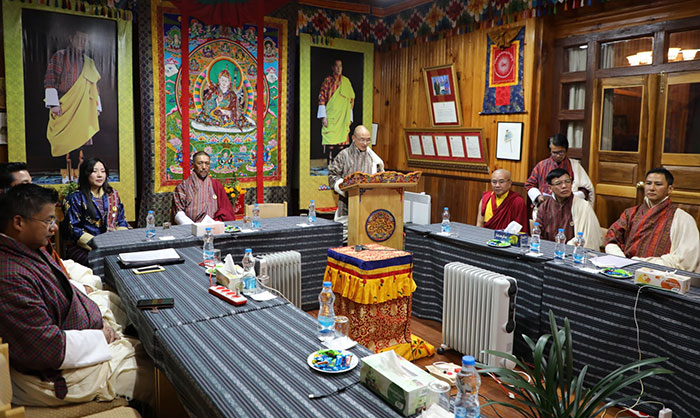JSW School of Law to explore the GNH in law and justice system
Thinley Namgay
While scholars,both from Bhutan and outside, have explored the impact of a GNH-centric worldview on areas such as development, economics, public policy, and finance, the JSW School of Law will explore another dimension to the development philosophy.
JSW School of Law will explore what GNH have to say about the rule of law and the justice system. The School is conducting a three-day virtual international conference on ‘Gross National Happiness and Law,’ which began on November 11 coinciding with the 65th birth anniversary of His Majesty the Fourth Druk Gyalpo.

The three-day virtual international Gross National Happiness and Law conference began on Wednesday
The School’s President, Her Royal Highness Princess Sonam Dechan Wangchuck, said that JSW Law started the broad interdisciplinary research initiative in its first GNH and Law Conference in 2018. This sequel conference is intended to build upon the same platform
Participants from Asia, North America and Europe are taking part in the conference. “In this year’s conference, scholars from around the world will continue to explore the interdisciplinary relationship between GNH and the Law,” a press release from the JSW Law stated.
Her Royal Highness said that the rule of law was a prerequisite for long-term prosperity, peace, and stability and one of the most important elements of GNH was its commitment to good governance.
“Good governance requires institutions and entities, including the state, are accountable to laws, equally enforced and independently adjudicated, and are consistent with human dignity, norms, and standards.”
Her Royal Highness said that GNH was rarely associated explicitly with the law in emerging literature, the governance in Bhutan was regulated by the GNH framework, ensuring that the laws are enacted, enforced, or interpreted with due regard to the contextual understanding of Bhutanese values and practices – particularly, GNH values.
“To do this, we examine the relationship or the interaction of law with the natural environment, development, religion, culture, and other fields that contribute to happiness and wellbeing,” said Her Royal Highness.
Her Royal Highness, during the opening of the conference, also launched the school’s final report of the ‘Legal Needs Assessment’ (LNA) empirical study and the new undergraduate course-‘GNH and the Law’. The new course-‘GNH and the Law’ is an interdisciplinary exploration of the relationships between GNH and Law.
LNA is a first major research initiative published by JSW Law which took around two years starting 2018. A team of JSW Law researchers travelled to all 20 dzongkhags exploring how the concept of justice is embraced, understood, used, and who has the authority to address justice-related concerns.
The founding dean of the law school, Sangay Dorjee, said that the new course would begin from next year and it would help further provide quality legal education for the students. “This course will definitely increase the understanding of GNH and how it plays the role to provide justice.”
Law school officials said that the LNA team explored a myriad of dispute resolution processes used by the now aging generations of mediators and resolvers, and how Bhutan’s rich cultural heritage directly informed those processes. “Our researchers documented how individuals in communities access justice, and how they gathered stories of hardship.”
LNA is also expected to use as a legal template in other South Asian countries.
JSW Law started in 2017 as the country’s first and only law school and offers a five-year degree in bachelor of laws and a diploma in national law. Currently, the school has 87 students of which 57 are women.

